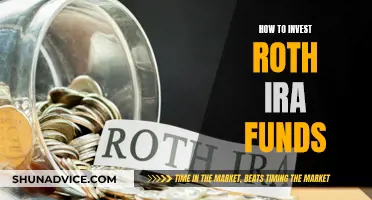
A Roth IRA is a type of tax-advantaged retirement account, while an index fund is a type of investment that tracks a market index. Both are powerful tools for building wealth, but they serve different purposes. A Roth IRA is an account where you hold investments such as index funds, individual stocks, and bonds. Index funds are a common type of investment within Roth IRAs and other types of retirement accounts. They offer automatic portfolio diversification and are passively managed, meaning they aim to mirror the performance of a benchmark index rather than outperform it. On the other hand, Roth IRAs offer tax advantages, allowing your investments to grow tax-free. With a Roth IRA, you contribute after-tax money, and your money grows untaxed. When you reach retirement age, you can make tax-free withdrawals.
| Characteristics | Values |
|---|---|
| Type of Account | A Roth IRA is a type of investment account used to save for retirement. |
| Type of Investment | An index fund is a type of investment that tracks a market index. |
| Tax Efficiency | A Roth IRA allows funds to grow without being taxed, meaning more money in your pocket for retirement. |
| Tax Implications | Contributions to a Roth IRA are not tax-deductible, but withdrawals are tax-free after age 59 1/2. |
| Investment Options | A Roth IRA can hold various investments, including index funds, individual stocks, and bonds. |
| Diversification | Index funds offer automatic portfolio diversification by investing in multiple securities, reducing risk. |
| Contribution Limits | Roth IRA contribution limits are $7,000 for those under 50 and $8,000 for those 50 and older in 2024. |
| Income Restrictions | There are income limits for contributing to a Roth IRA, which vary based on filing status. |
| Management Style | Index funds are typically passively managed, aiming to mirror a benchmark index rather than outperform it. |

Tax efficiency
A Roth IRA is a type of tax-advantaged retirement account. This means that, while contributions are made with after-tax money and are not tax-deductible, the money in the account grows tax-free and can be withdrawn tax-free, provided certain conditions are met. This is in contrast to a traditional IRA, where contributions may be tax-deductible but withdrawals are taxed.
Index funds are a type of investment that can be held within a Roth IRA or other types of investment accounts, such as a taxable brokerage account. They are a popular choice for Roth IRAs because they offer automatic portfolio diversification, which reduces risk.
When deciding whether to invest in a Roth IRA or an index fund, it is important to understand the tax implications of each. With a Roth IRA, you benefit from tax-free growth and withdrawals in retirement, whereas with an index fund, the tax treatment will depend on the type of account it is held in.
If you invest in an index fund through a taxable brokerage account, you will need to pay taxes on any dividends and capital gains distributions. This can reduce your overall returns. However, if you invest in an index fund through a Roth IRA, you can take advantage of tax-free growth and withdrawals, maximising your returns.
Additionally, there are income thresholds that determine eligibility for contributing to a Roth IRA. For 2024, individuals must have a modified adjusted gross income of less than $146,000 for single filers or $230,000 for married couples filing jointly to make the full contribution of $7,000. Those who are 50 or older are also eligible for an additional $1,000 catch-up contribution.
Therefore, if your goal is to maximise tax efficiency, investing in a Roth IRA can be a more attractive option, provided you meet the eligibility requirements. By investing in index funds through a Roth IRA, you can benefit from both the tax advantages of the account and the diversification benefits of the investment.
Registering an Investment Fund: A Step-by-Step Guide
You may want to see also

Dividend stock funds
When choosing dividend stock funds, it's important to consider the company's fundamentals, such as balance sheets, profit-and-loss statements, and free cash flow. Additionally, look for companies with a history of consistently increasing their dividends, even during tough economic periods. Diversification is also crucial to manage risk effectively.
Sector Fund Investment: Strategies for Success
You may want to see also

Nasdaq-100 index funds
When considering whether to invest in a Roth IRA or index funds, it is important to understand the differences between the two. A Roth IRA is a tax-advantaged individual retirement account that allows your investments to grow tax-free. On the other hand, index funds are a type of investment fund that tracks the performance of a particular stock market index, such as the S&P 500 or the Nasdaq-100.
- Diversification and Risk: Nasdaq-100 index funds offer some diversification across different tech and growth-oriented companies. However, it is important to note that these funds have a higher concentration in the technology sector compared to more broad-based indexes like the S&P 500. As such, investing in a Nasdaq-100 index fund carries a higher level of risk and volatility associated with the technology sector's performance.
- Performance and Returns: The Nasdaq-100 index has a proven history of high index performance, and the funds that track this index have also delivered strong returns. For example, the Shelton NASDAQ-100 Index Direct ETF (NASDX) has a 5-year annualized return of 21.8%, while the Invesco QQQ Trust ETF (QQQ) has a 5-year annualized return of 21.9%.
- Expense Ratios: When investing in index funds, it is essential to consider the expense ratio, which represents the ongoing fees charged by the fund. The expense ratio for the Shelton NASDAQ-100 Index Direct ETF (NASDX) is 0.52%, meaning you would pay $52 annually for every $10,000 invested. In contrast, the Invesco QQQ Trust ETF (QQQ) has a lower expense ratio of 0.20%, resulting in a $20 annual fee for every $10,000 invested.
- Suitability: Nasdaq-100 index funds are suitable for investors who believe in the long-term growth potential of the technology and innovation sectors. These funds provide exposure to some of the largest and most innovative companies in the world. However, due to the higher risk and volatility associated with the technology sector, Nasdaq-100 index funds may be more suitable for investors with a higher risk tolerance and a longer investment horizon.
In summary, Nasdaq-100 index funds can be a compelling investment option within a well-diversified portfolio. They offer high exposure to the technology and growth sectors, have delivered strong historical returns, and typically have low to moderate expense ratios. However, it is important to carefully consider your investment goals, risk tolerance, and time horizon before investing in any index fund, including those tracking the Nasdaq-100.
Unlocking Tax Benefits: Opportunity Zone Funds ETF
You may want to see also

Eligibility
For the 2024 tax year, individuals must have a modified adjusted gross income of less than $146,000 if filing alone, or $230,000 if filing jointly, to make the full contribution of $7,000. Those who are 50 or older are also eligible for an additional $1,000 catch-up contribution.
There is no age limit on making regular contributions to a Roth IRA for those aged 70 1/2 or older. However, for a traditional IRA, you cannot make a regular contribution if you are 70 1/2 or older.
Minors can contribute to an IRA based on the limits of their own earned income and not that of their parents.
That being said, index funds are typically purchased through a brokerage account or directly from a fund provider, and these entities may have their own eligibility requirements, such as minimum investment thresholds.
Creating a Family Investment Fund: A Guide for Beginners
You may want to see also

Capital gains
When considering whether to invest in a Roth IRA or index funds, it is important to understand the differences between the two. A Roth IRA is a type of tax-advantaged retirement account, while an index fund is a type of investment that tracks a market index. Both are powerful tools for building wealth, but they serve different purposes.
One of the key benefits of investing in a Roth IRA is the ability to generate tax-free capital gains. In a Roth IRA, your investments can grow tax-free, and if you are at least 59 1/2 years old and have held the account for at least five years, withdrawals are also tax-free. This feature makes Roth IRAs an attractive option for long-term growth without the drag of taxes.
For example, consider the Vanguard Wellington Fund Investor Shares (VWELX), which has posted an annualised return of 8.6% over the past decade. However, after adjusting for taxes on distributions and the sale of shares, the net annualised return drops to 6.3%. This difference in returns can represent a significant amount of money over time, and it is important to consider the impact of taxes on investment returns.
Index funds, on the other hand, may not offer the same tax advantages as Roth IRAs. While they can be a good choice for diversification and long-term growth, the capital gains generated from index funds may be subject to taxes. It is important to consider the tax implications of any investment and to understand how they can impact your overall returns.
When investing in index funds, it is important to remember that they can be held in various accounts, including taxable brokerage accounts. This means that you can invest in index funds outside of a Roth IRA if you have reached the contribution limits for your retirement account. By utilising both investment options, you can maximise your tax advantages while still benefiting from the diversification and potential returns offered by index funds.
In summary, while both Roth IRAs and index funds can be valuable tools for building wealth, they offer different advantages when it comes to capital gains and tax treatment. Roth IRAs provide tax-free growth and withdrawals, making them ideal for long-term retirement savings. Index funds offer diversification and potential for strong returns but may be subject to taxes on capital gains, depending on the type of account they are held in.
Crowd-funded Investment: The Future of US Venture Capitalism?
You may want to see also
Frequently asked questions
A Roth IRA is a type of tax-advantaged retirement account, while an index fund is a type of investment that tracks a market index. You can invest in index funds with virtually any type of investment account, including a Roth IRA.
A Roth IRA allows your money to grow tax-free. Withdrawals are also tax-free if you are at least 59 1/2 years old and your account has been open for at least five years. Additionally, there are no required minimum distributions, unlike a traditional IRA. However, there are income thresholds that restrict eligibility for Roth IRAs.
Index funds offer automatic portfolio diversification, as they typically invest across many different securities. They are also passively managed, which means lower costs compared to actively managed funds.
Popular index funds include the Vanguard S&P 500 ETF (VOO) and the SPDR S&P 500 ETF (SPY), which track the performance of the S&P 500 index. Other options include Nasdaq-100 index funds, dividend stock funds, value stock funds, and target-date funds.







